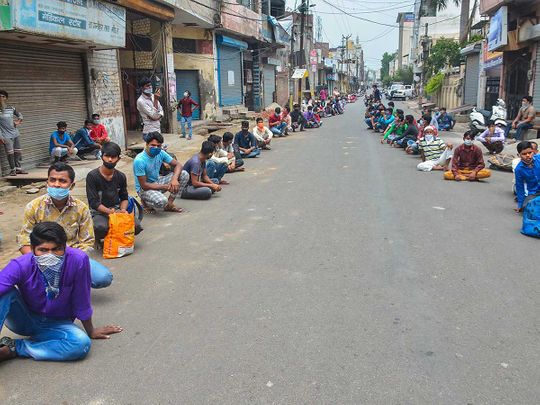
Patna: Life has turned into a living nightmare for a number of coronavirus (COVID-19) survivors in Bihar. Days after they returned home fit, battling the deadly virus at hospitals for days in isolation, the survivors now face social boycott from their neighbours and villagers who believe they might be still carrying the virus and mixing with them could endanger one’s life. The villagers have not only boycotted the survivors, but also the families of the survivors. The result is that such families have virtually locked themselves in their homes to avoid coming across insulting remarks from their neighbours.
From neighbours, relatives and close friends to shopkeepers ... just about no one wants to mix with them. But what beats everything is the fact that people have stopped talking to the survivors’ families even over the phone! Such is the social stigma linked to this infection. The idea of social distancing, as such, looks to be slowly turning into ‘social discrimination’ on the ground.
No one knows it better than 36-year-old Mohammad Jumman, who is being addressed as “Yamraj” (lord of death) by his neighbours. The neighbours have also stopped visiting his ration shop — located in Jamalpur town of Munger district — fearing that goods collected from his shop could leave them infected with coronavirus.
“I can’t explain my pain in words. Even getting infected with coronavirus didn’t trouble me as much as the behaviour of the people,” said a shocked Jumman. He said he was discharged from hospital after he tested negative — not once but thrice. “Yet, people still consider me as someone spreading the virus,” he said. The situation, he said, is such that none even wants to take his phone calls.
Gautam Kumar, a resident of Nadlal Chhapra locality in Patna, is facing hard times as vegetable sellers, grocery shop owners, barbers and even cleaning staff members are maintaining a distance from his family. The result is that he has had to travel far to buy essential commodities for his household. “I never expected I would face this kind of social ostracism for contracting coronavirus. For a moment, I find it logical for the neighbours to maintain a certain distance with me, but I don’t understand why they are subjecting my entire family to social boycott,” Gautam rued.
Ostracised by neighbours
But a family from Siwan has been living in extreme shock for the past month as they have been ostracised by the neighbours. Such is the situation that the family has just locked themselves in their home to escape insulting remarks from the neighbours.
“It has been over a month since the patient was declared completely fit and returned home after being tested negative. All family members also returned negative results for all three tests. Yet, the neighbours are maintaining distance from us. They don’t even have the basic courtesy to say us a word of consolation at this hour of distress,” a family member said.
He added only a COVID-19 survivor or his families could understand the kind of social boycott they have been facing from the society. “It’s very painful and depressing,” he added wishing not to be named. The coronavirus survivor had returned from Dubai when he was tested positive during screening, but he won the battle sometime later at the hospital.
Health experts have expressed shock and surprise over the way the survivors have been facing undeclared social boycott. “There is no chance of infection from the persons declared fit by the hospitals, rather their immunity level goes up. It’s wrong to show discrimination towards such persons. They need moral support instead,” said Dr Mukul Singh, nodal officer at Nalanda Medical College and Hospital, the lone Patna-based hospital dedicated to treatment of patients with coronavirus.
A state health department report said a total of 218 COVID-19 patients, out of a total of 547, have recovered from the deadly virus in the last 48 days since the first case was reported on March 22 in Bihar. What is surprising indeed is that the recovery rate of patients in Bihar is at 35 per cent, which is more than the national average of 27.6 per cent, according to the health department.












